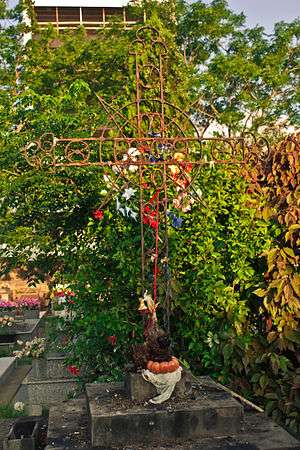Macumba
Macumba (Portuguese pronunciation: [maˈkũᵐbɐ]) is a syncretic religion practiced in Brazil, Argentina, Uruguay and Paraguay. It is sometimes considered by non-practitioners to be a form of witchcraft or black magic. Macumba was originally used to categorize all religions who practiced or believed in animistic-syncretism during the 1800s. In the 1900s Macumba became a slang term among Brazilians who aren’t affiliated with these religions. The religions that are referred to under the umbrella term Macumba are Candomblé, Giro, and Mesa Blanca. Although the word Macumba may be used among Afro-Brazilian religion practitioners to kindly refer to their practices, it is also used as a pejorative and even a racial slur by evangelical hate groups against these religions.[1]
| Macumba | |
|---|---|
| Type | Syncretic |
| Classification | Afro-Brazilian-witchcraft |
| Orientation | Quimbanda-Occultism |
| Region | Brazil, Argentina, Uruguay, Paraguay |
| Origin | 20th century Brazil |
History
Brazilian Macumba designates all Bantu religious practices, mainly in the Brazilian state of Bahia in the nineteenth century.[2] Later (in the 20th century), these practices were organized in what is now called Umbanda, Quimbanda and Omoloko. Macumba became common in parts of Brazil, Uruguay, Paraguay and Argentina. This word is used by some people as a pejorative word meaning black magic. The word macumba is used in Brazil, Paraguay, Argentina and Uruguay, to refer to any ritual or religion of Afro-American origin, and although its use by outsiders is usually derogatory (referring to all kinds of religion, superstitions and rituals related with luck) and it is considered offensive, among its practitioners it is not seen negatively.[3]

Macumba is practiced in Brazil, Argentina, Paraguay and Uruguay. There appears to be a relationship with the concept of the Boto (the fresh-water porpoise found in the Amazonas River and its tributaries) having shape-shifting abilities and then while in the form of a human male having sexual relations with young women. This belief was noted in several Indigenous American villages along the Amazonas (Solimões) River, Rio Negro, and Rio Japurá.
Many practitioners continue to practice their traditional religions (Christianity, Islam, Judaism, etc.) but also practice Macumba, often in violation of the tenets of their official religious affiliations but which their social environment appears to quietly accept.
Some practitioners purport to use Macumba to inflict harm, financial failure, illness, death, etc. on other people for various reasons. Commonly, a Macumba spiritual leader will ask for a picture of the person on whom retribution is sought, with the name of the person written on the back of the picture. This kind of practice is often seen as sorcery or black magic.
Practices
Out of all the religions grouped into Macumba only followers of Candomblé sacrifice animals during their rituals. Animals are also sacrificed during Consultas. In Candomblé blood is a very sacred and symbolic item and is used as often as possible. Blood to these followers represents life pure essence and a bond that unites them all together as family.
Giro on the other hand use palm tree oil (azeite de dendé) in their rituals, this is because using blood has formed a negative stigma around Candomblé as many people associate animal sacrifice with savagery and see it as backwards. This dependence on blood and animal sacrifice has led to a loss of converts and a stigma to form around Candomblé and its followers. Since dendé is a similar hue to blood it works well as a replacement in many rituals that would require it. This also allows followers of Giro to practice without fear of being stigmatized.
Mesa Blanca on the other hand believes that blood and dendé can bring evil and misfortune on those who dare to use it in rituals. Dendé for example is linked to aggressive spirits of slaves, as well as other evils that the group has shunned and removed from their practices. The movement away from these two mediums can be seen as a way to distance themselves from Afro-Brazilian religions and the Macumba itself.
Honey is also important to these religions as it represents the spirits of Native Indians, the use of honey can be for healing as well as reconciliation. Honey is an entirely different color than blood and Dendé so it is not associated with the evils of first two liquids.
Water is the final liquid and is the main symbol for most religions other than Candomblé (which is blood). Water can be used to gaze into during consultas as it is believed looking into water can help attain wisdom or information. Water symbolizes life as it has the ability to heal but it can also represent the ability to avoid death.
Hierarchy
The hierarchy of many of these religions is family based and can be seen by the addressing of leaders in Candomblé as "mother" and "father". Also many leaders of these religions are female as a mother figure is needed.
References
- https://apublica.org/2017/11/os-santos-perseguidos/
- Hayes, Kelly E. (2007). "Black Magic and the Academy: Macumba and Afro-Brazilian "Orthodoxies"". History of Religions. pp. 283–31.
- www.religion.idoneos.com/
Sources
- Kelly E. Hayes, "Black Magic and the Academy: Macumba and Afro-Brazilian “Orthodoxies," History of Religions, 46,4 (2007), 283–315.
- “Macumba - Definition and Synonyms of Macumba in the English Dictionary.” English Dictionary, englishdictionary.education/en/macumba.
- Shapiro, Dolores J. “Blood, Oil, Honey, and Water: Symbolism in Spirit Possession Sects in Northeastern Brazil.” Wiley, November 1995
External links
- "BBC - Religion: Candomblé". bbc.co.uk. Retrieved 2017-05-07.
- "Macumba Definition". Retrieved 2017-11-01.
- Shapiro, Dolores J. (1995). "Blood, Oil, Honey, and water". American Ethnologist. 22 (4): 828–847. doi:10.1525/ae.1995.22.4.02a00090.